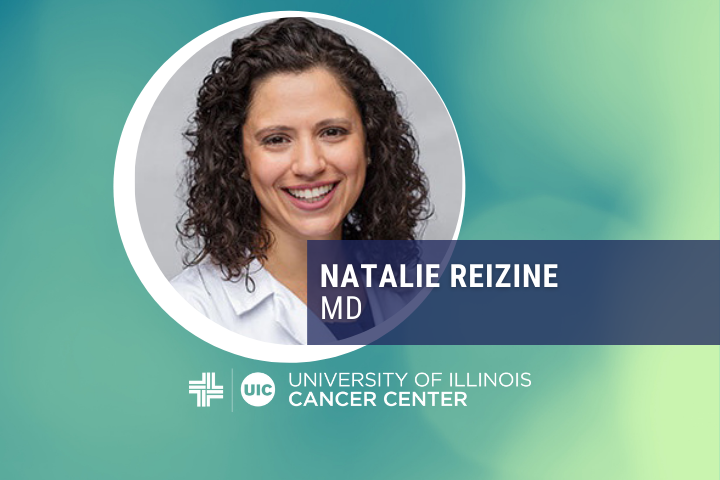
Developing and designing clinical trials to improve personalized treatment approaches for genitourinary cancer patients is a passion for University of Illinois Cancer Center member Natalie Reizine.
As a medical oncologist, Reizine, MD, a member of the Cancer Center’s Translational Oncology program and assistant professor of medicine at UIC, specializes in treating prostate, kidney, bladder and germ cell tumors.
She studies how genes impact her patients’ response to medications and therapies, in hopes of reducing their toxicities from treatment while maximizing their therapeutic benefits. Reizine is also interested in learning how patients’ environments affect their disease.
“Our patients have different obstacles to overcome in their health care needs. Travel is big issue, not just for treatments but for clinical trials because they require extra visits,” she explained. “Many of our patients have food and housing instability, and are often alone when they come to the clinic. I want to treat our patients any way I can to ensure the care they receive addresses their whole health, including their social determinants of health.”
A history buff, Reizine intended to become an educator, studying the subject at the University of Pittsburgh. That changed when her father was diagnosed with cancer. Learning about the disease consumed her. After witnessing the procedures and treatments her father endured and growing close to his physician, Reizine returned to Pitt for her sophomore year and transitioned to pre-med, while also maintaining her history major. Following graduation from Loyola University Stritch School of Medicine, she combined her love of medicine and history as a bioethics fellow at the University of Chicago.
“It was the best of both worlds,” said Reizine, who is the sister of fellow Cancer Center member Dr. Nicole Gastala. “In studying the social determinants of health, I was able to merge history and science.”
Since coming to UI Health in August 2021, Reizine has treated more than 100 patients, with prostate cancer being the most prevalent disease she has diagnosed. In her short time in the hematology/oncology clinic and the Cancer Center, she has seen significant disparities in the patient population.
“I have really gotten to know our patients, and I adore them,” said Reizine, who was recently awarded a clinical trial grant from the Cancer Center. “I have begun making sure I have the clinical support I need to provide them the best care possible.”
Prostate cancer is the most common of the genitourinary cancers, with about 268,490 new cases being predicted in 2022, according to the American Cancer Society. About one man in eight will be diagnosed with prostate cancer during his lifetime, and the disease is more likely to develop in older men and in non-Hispanic Black men. About 34,500 deaths will occur from prostate cancer in 2022, the ACS said.
Symptoms of genitourinary cancers vary depending on the type of cancer, but most common warning signs are blood in the urine, urine that looks darker than normal, extended duration of back pain, painful or frequent urination, abdominal pain and weight loss or fatigue.
